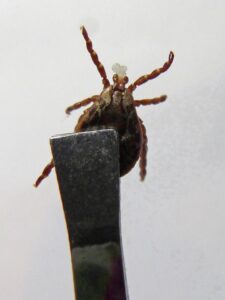Parasites are creatures that live either on or inside the body of their host and take their nutrients from their host for survival. All too often this has a significantly detrimental effect on the health and well-being of the host. There are many different types of parasites that can affect our pets. However, there is one that is particularly well known and will affect most animals at least once during their lifetime – fleas. Here’s what you need to know about fleas and what they mean for your pet.
Fleas: An Overview
Fleas are small, wingless creatures that are notoriously hard to get rid of. They have sharp mouthparts that they use to attach to their host and access their blood, which they depend on for food. Unfortunately, flea saliva is highly irritating, causing the animal that they are inhabiting to scratch and itch – the most well-known symptom of a flea problem. For some pets, their reaction to flea saliva is so severe that they develop a condition known as flea allergy dermatitis.
Another big issue with fleas is how quickly they reproduce. A single female can lay as many as 50 eggs in a single day. These eggs only take 21 days to mature into adults that are capable of reproducing. These eggs tend to roll off the host animal and drop onto floors and furniture. Impossible to see, you won’t even know that they are there until they start to hatch and bite either your pet or the human members of your family – wherever they can find a meal! This short life-cycle makes it absolutely crucial to destroy fleas at every stage by treating both your home and your pet.
How Did My Pet Get Fleas?
Unfortunately, animals can pick up fleas just about anywhere. These parasites are extremely resilient and can live in a wide variety of environments and climates and jump onto passing animals when they want to catch a meal. However, there are several ways in which your pet is more likely to catch fleas.
Contact with other animals. Lots of wild animals carry fleas, as do a smaller number of other pets. If your pet comes across them while out on a walk with you, they don’t even have to get that close to contract fleas because these parasites have immense jumping capabilities. Some of the most prolific carriers of parasites include rodents, birds, ferrets, squirrels, skunks, raccoons, and foxes.
Your home. You might think that your home is as clean as can be, but fleas can access your indoor environment much more easily than you might think. Animals, such as wild mice, can bring fleas into your property, or they can jump right into an open door or window. Once there are fleas and eggs in your home, they can spread easily through soft furnishings. You also ought to consider this if you pick up second-hand furniture, furnishings or clothes, and give them a thorough clean outside before bringing them indoors.
Outdoors. Fleas have the ability to survive outdoors for long stretches of time, particularly in the summer months when the weather is warm and humid. Some of the places that fleas can hide outdoors and then catch a ride on your pet include dog parks, kennels, porches, neighboring yards and even just out on the sidewalk.
Treatment For Fleas
The good news is that there are a variety of treatments that are capable of killing off fleas at every stage of their life-cycle. These range from orally-taken medications and spot-on treatments, to shampoos and other topical solutions. Your vet will be able to advise you which is the right treatment for your pet based on their breed, age, and health. Once treated, your vet will also be able to help you find the perfect preventative to keep your pet safe from these pesky creatures.
In addition to treating your pet, you will also need to treat your home. There is a myriad of flea treatments that can eliminate them from your home, with powders and ‘bombs’ being some of the most effective. You’ll also need to ramp up your cleaning and vacuuming to ensure that any eggs or larvae are also picked up and destroyed. Be sure to dispose of the vacuum bag after every use so that no eggs or larvae can fall back out into your home or yard.
For more advice on fleas and how to keep your pet safely protected from the effects of an infestation, please speak to our experienced veterinary team today.



